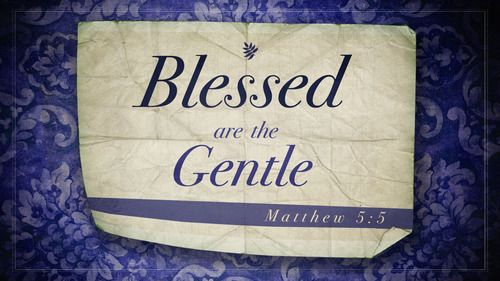The Meek / Gentle
Blessed are the Meek (Gentle)

“Blessed are the meek, for they will inherit the earth” -Matthew 5:5 (NIV)
What is Meekness?
To be meek is to exhibit a calm and soothing disposition. When we are faced with a crisis or a threat, our bodies react with the flight or fight response. Our nervous system floods our bodies with chemicals that make us ready to attack the threat or run away.
Meekness represents an alternative to fighting or hiding. The Greek philosopher Aristotle defined it as “a mean [average] between bad temper and spineless incompetence, between extreme anger and indifference.” The Theological Lexicon of the New Testament says that a meek person “keeps his serenity in all the misfortunes that come his way, bearing them calmly and patiently.”
In more recent times, President Roosevelt famously lived by the motto “Speak softly, and carry a big stick.” Meekness is not weakness, it is a quiet strength of character that exercises restraint. Another common translation for this Bible word is gentle, which is used twice to describe Jesus:
In the New Testament, the Apostles urge us to live with this same gentle and humble attitude:
Meekness represents an alternative to fighting or hiding. The Greek philosopher Aristotle defined it as “a mean [average] between bad temper and spineless incompetence, between extreme anger and indifference.” The Theological Lexicon of the New Testament says that a meek person “keeps his serenity in all the misfortunes that come his way, bearing them calmly and patiently.”
In more recent times, President Roosevelt famously lived by the motto “Speak softly, and carry a big stick.” Meekness is not weakness, it is a quiet strength of character that exercises restraint. Another common translation for this Bible word is gentle, which is used twice to describe Jesus:
- Matthew 11:29, “Take my yoke upon you and learn from me, for I am gentle and humble in heart, and you will find rest for your souls.” (NIV)
- Matthew 21:5 (quoting Zechariah 9:9) ,“Say to Daughter Zion, ‘See, your king comes to you, gentle and riding on a donkey, and on a colt, the foal of a donkey.’” (NIV)
In the New Testament, the Apostles urge us to live with this same gentle and humble attitude:
- 2 Timothy 2:25-26 “Opponents must be gently instructed, in the hope that God will grant them repentance leading them to a knowledge of the truth, and that they will come to their senses and escape from the trap of the devil, who has taken them captive to do his will.” (NIV)
- 1 Peter 3:15-16 “ But in your hearts revere Christ as Lord. Always be prepared to give an answer to everyone who asks you to give the reason for the hope that you have. But do this with gentleness and respect, keeping a clear conscience, so that those who speak maliciously against your good behavior in Christ may be ashamed of their slander.” (NIV)
The Promise of the Land
“The ‘meek' are those who suffer and who have been humbled, and yet they do not seek revenge but God’s glory and the welfare of others. In other words, they lovingly trust God and hope in God’s timing and God’s justice.” -Scot McKnight, Sermon on the Mount, p. 42
In Israel, the people who owned the land almost always took it by force. Richard Rohr explains it this way:
"There’s irony here. If there was one hated group in the Palestine of Jesus’ day, it was landlords—those who possess the land. Nobody possessed land except by violence, by oppression, by holding onto it and making all the powerless peasants pay a portion of their harvest.” -Richard Rohr, Jesus’ Alternative Plan, p. 162
The irony that Rohr refers to the difference between the kind of people that usually took possession of the land and the kind of people Jesus says will inherit it. The land belonged to the latest person (or nation) to take it by force—and the Jews knew that full well. They had to take their land by force (during the conquest of Canaan), and then they lost their land at various times to the Philistines, the Assyrians, the Babylonians, the Persians, the Greeks, and the Romans.
Jesus is contrasting the gentleness of God’s people with the vengeance and violence of the rest of the world, and promising that God will bring about an unexpected reversal of the way life typically worked. Instead of the land going to the rich and powerful, it would be given to those who are humble and gentle.
This beatitude seems to be a direct quote of Psalm 37:11, “But the meek will inherit the land and enjoy peace and prosperity.” Psalm 37 (which Westside recently studied in our shepherding groups) teaches us to stop worrying about what the rich and powerful are doing in the world, and humbly trust that God will bless his people in the end.
In world where people forcefully take hold of whatever they can get, Jesus is reminding us that it is the humble and gentle at heart who will receive the blessing that others are violently fighting for. Are we willing to make his kind of gentleness our way of life?
